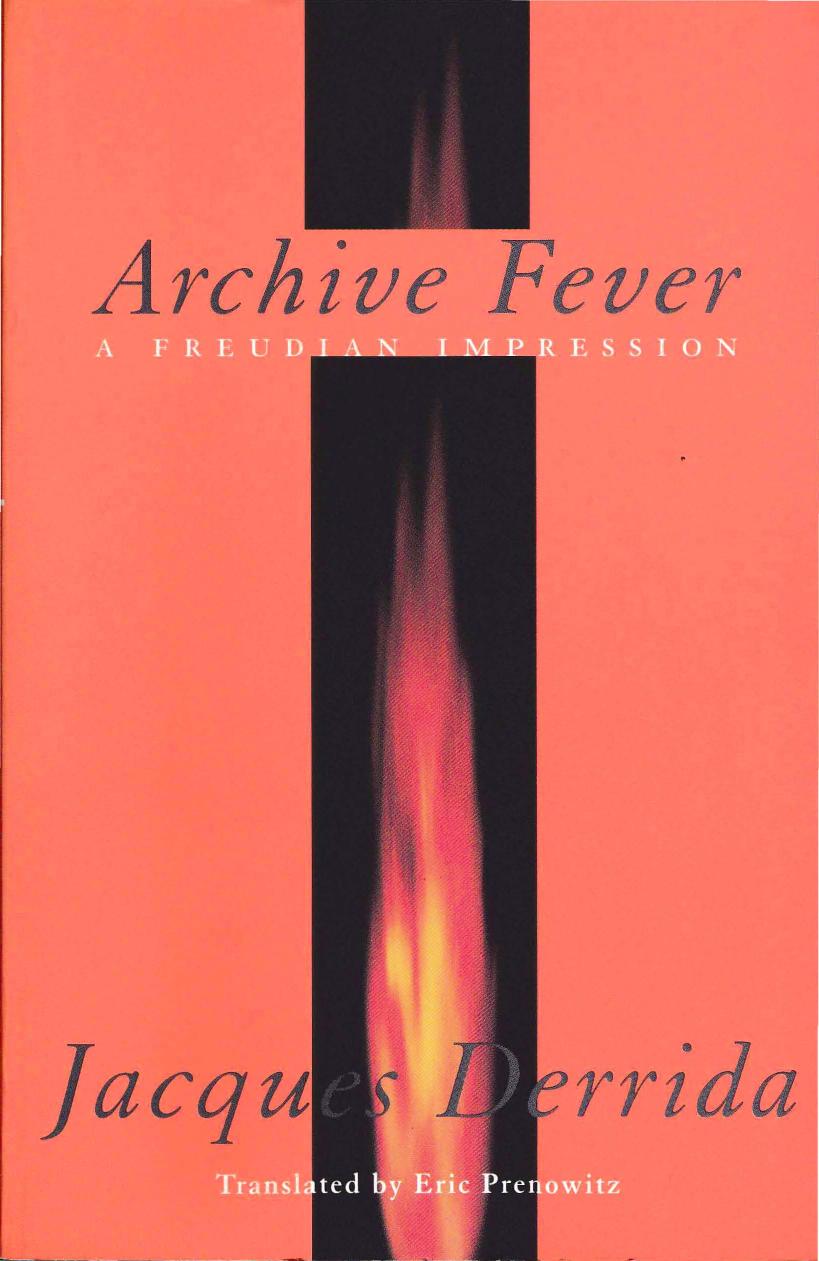Jacques Derrida: Archive Fever: A Freudian Impression (1996)
Filed under book | Tags: · archive, philosophy, psychoanalysis, technology, time

“In Archive Fever, Jacques Derrida deftly guides us through an extended meditation on remembrance, religion, time, and technology—fruitfully occasioned by a deconstructive analysis of the notion of archiving. Intrigued by the evocative relationship between technologies of inscription and psychic processes, Derrida offers for the first time a major statement on the pervasive impact of electronic media, particularly e-mail, which threaten to transform the entire public and private space of humanity. Plying this rich material with characteristic virtuosity, Derrida constructs a synergistic reading of archives and archiving, both provocative and compelling.”
Translated by Eric Prenowitz
Publisher University of Chicago Press, 1996
ISBN 0226143368, 9780226143361
113 pages
PDF (updated on 2021-11-11)
PDF (article, published in Diacritics, 25:2, Summer, 1995, pp 9-63, added on 2012-9-3)
Iain Thomson: Heidegger on Ontotheology. Technology and the Politics of Education (2005)
Filed under book | Tags: · critique, essentialism, hermeneutics, national socialism, nihilism, ontology, phenomenology, philosophy, philosophy of technology, technology

Heidegger is now widely recognized as one of the most influential and controversial philosophers of the twentieth century, yet much of his later philosophy remains shrouded in confusion and controversy. Restoring Heidegger’s understanding of metaphysics as ‘ontotheology’ to its rightful place at the center of his later thought, this book demonstrates the depth and significance of his controversial critique of technology, his appalling misadventure with Nazism, his prescient critique of the university, and his important philosophical suggestions for the future of higher education. It will be required reading for those seeking to understand the relationship between Heidegger’s philosophy and National Socialism, as well as the continuing relevance of his work.
• Examines the direct connection between Heidegger’s philosophy and his decision to join the National Socialist party in 1933 • Provides a clear reconstruction and defense of Heidegger’s later philosophy • Bridges the gap between continental and analytic philosophy
Publisher Cambridge University Press, 2005
ISBN 052161659X, 9780521616591
202 pages
PDF (updated on 2013-6-3)
Comment (1)Paul Virilio: Speed and Politics (1977/2006)
Filed under book | Tags: · philosophy, politics, speed, technology, war

“Speed and Politics is the matrix of Virilio’s entire work. Building on the works of Morand, Marinetti, and McLuhan, Virilio presents a vision more radically political than that of any of his French contemporaries: speed as the engine of destruction. It presents a topological account of the entire history of humanity, honing in on the technological advances made possible through the militarization of society. Parallel to Heidegger’s vision of technology, Virilio sees speed—not class or wealth—as the primary force shaping civilization. In this ‘technical vitalism,’ multiple projectile—inert fortresses and bunkers, the ‘metabolic bodies’ of soldiers, transport vessels, and now information and computer technology—mutually prosthetize each other in a permanent assault on the world and, through it, on human nature. Written at a lightning-fast pace, Virilio’s landmark book is an split-second, overwhelming look at how humanity’s motivity has shaped the way we function today, as well as a view into what might come of it.”
Keywords and phrases
glacis, total war, Vauban, Gyrovagues, deterritorialization, bourgeoisie, fascist, Clausewitz, dromocratic, Michel Poniatowski, Paris Commune, totalitarian, prosthesis, Alfred Wegener, ancien regime, Marxist, logistical, Sun Tzu, war machine
Originally published as Vitesse et Politique, Editions Galilee, Paris, 1977.
Translated by Mark Polizzotti
Introduction by Benjamin Bratton
Publisher Semiotext(e), 2006
ISBN 1584350407, 9781584350408
174 pages
PDF (4 MB, updated on 2017-6-26)
Comment (0)
